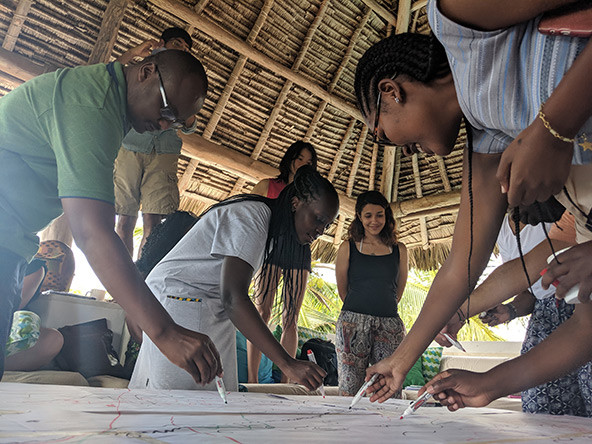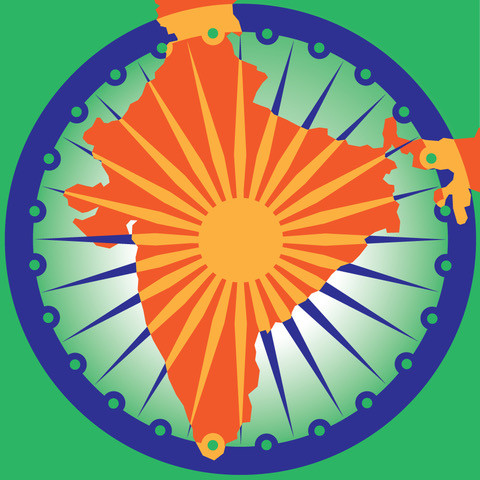 (Photo courtesy of Amani Institute)
(Photo courtesy of Amani Institute)
We founded Amani Institute to answer two questions.
For Ilaina, it was a memory of my first university class: in an overcrowded room, after three uninterrupted hours of lecturing on the “Logic and Theory of Knowledge,” the professor matter-of-factly remarked that “fewer than 30 percent of you will graduate.” When a brave hand raised to ask why, he only replied: "Many of you don’t know what you want, others won’t be able to pay for it, and others won’t like it." It shocked me. “If we already know how far short higher education is falling, why haven’t we done anything?”


For Roshan, it was guest lecturing at leading universities in the United States and discovering how under-prepared so many graduate students that were looking to work in social impact were. Leading social entrepreneurs all complained that they couldn’t find enough people with the skills and qualities they needed to grow their organizations. “If this was the case at the best universities in the world, what is it like everywhere else?”
When we met in the summer of 2010, we decided that we were uniquely positioned to answer those two questions and create an alternative model for the higher education of changemakers. In 2013, we launched a “Post-Graduate Certificate in Social Innovation Management” in Nairobi, Kenya. The six-month alternative Masters program we administer today—with two months online and four months in-person in either Kenya, Brazil, or India—is open to anyone with an undergraduate degree, regardless of professional background or nationality, and consists of 10 cutting-edge professional skill-building courses (taught by real-world practitioners), a social innovation project, an apprenticeship featuring an “intrapreneurship challenge,” and a much-beloved and highly personalized curriculum around self-development. Although the program is otherwise run independently of formal higher education, Amani graduates are eligible to transfer credits towards an MBA from Lynn University or a Diploma in Social Innovation from the UN-mandated University for Peace.
Since innovation and impact remain cornerstones of our mission, the program has undergone structural tweaks and changes in emphasis over the years, but the core model remains constant: six intertwined elements that combine adult-education best practices with our own innovations. Some of these elements are offered by other institutions, but we venture that nobody else provides a world-class master’s-equivalent program as affordable and personalized and experiential as this one (and in the global south no less).
1. A Flipped Global Approach
The “flipped classroom” has taken root in educational innovation, but we take it further by flipping the world. Emerging markets represent the frontiers of social change. While they are hubs for social innovation—and move quickly, sometimes much faster than the West—the best educational institutions are largely still found in richer countries. Being from emerging markets ourselves—and knowing both the great hunger for contribution and vast pools of changemaking talent in these regions—we wanted to offer a world-class educational experience there (while welcoming innovation-minded students from the West). As of today, 20 percent of our students are from North America and Europe, with 80 percent from Latin America, Africa, the Middle East, and Asia.
2. A “Medical School” for Changemaking
Making impact is hard, and you need to train and practice accordingly, like a doctor or an Olympic athlete. And because we work as much as possible at the bottom of the “iceberg model” of systems change—changing mindsets and behaviours, in addition to the tools and knowledge at the top—we prioritize experiential, practical, and reflective group work over academic paper-writing, emphasizing the changemaker skills of reimagining and building, rather than just critiquing others’ work. Learning happens at the edge of one’s comfort zone, so much of what happens at Amani Institute is “outside” the classroom: from individual social innovation projects, field trips, apprenticeships, public events, interactions with local leaders, and more.
3. Skills for the 21st Century
While a traditional master’s in international development or peace studies provides knowledge of the history and schools of thought in the field—and builds critical thinking, research, and writing skills—such degrees don’t prepare students to do what employers most need: to lead a multitude of projects, to communicate effectively with people different from you, to innovate rapidly and frequently to solve an unending flow of new problems, and to manage yourself and others through difficult and exacting work, sometimes with lives and livelihoods at stake. With those four skillsets at our core, we set out to design for what people will do in their daily jobs in the social sector and how to help them hit the ground running.
Because we wanted our Fellows to learn from leading practitioners rather than theorists, we used to joke that having a PhD is inversely correlated with being an Amani faculty member (with some honourable exceptions). Our current faculty pool of more than fifty leaders comprise a co-recipient of the Nobel Peace Prize, a co-developer of McKinsey’s leadership model, founders of impact investing firms, an award-winning documentary producer, and dozens of CEOs of leading social sector organizations. Our brief to them is simple: teach the tools and skills you use on a daily basis to get your own work done.
(We have also designed new courses ourselves that are rarely offered anywhere else, such as our courses in Bio-Empathy: Learning from Nature, The Inner Journey of the Changemaker, and The Process of Social Innovation.)
4. The Inner Journey of the Changemaker
Social change work is hard, placing demands on more than just your professional self. To responsibly and effectively bring change into the world, we need to develop the capacity to lead ourselves; “Know Thyself” is the oldest advice out there. When we were first starting out, several of the world’s most successful changemakers reminded us that we’re more likely to unlock our highest potential and achieve greater impact when we align with our values and act from our own inner wisdom.
Our “inner journey” curriculum is therefore about the personal dimension of work in social change, about learning to curate a reflective conversation with yourself while you act, to build behaviors that help you continuously refine your values, purpose, resilience and impact as they shift and grow over time. The majority of our alumni say that it’s their favorite part of the program.
5. Affordability for Inclusion and Diversity
There is no solution in sight to the affordability crisis in higher education and a further tragedy is how many talented changemakers opt for private sector careers to pay off their student debt, rather than bringing their abilities to social change. Without solving that problem, schools of public policy might actually be taking more people out of public service than bringing them in.
It still costs money to run a world-class educational and life-changing experience, and although our tuition is a fraction of an American master’s degree, it remains on the higher side in the emerging markets we operate in. But as an independent social enterprise, we are committed to keeping our prices as accessible as possible, to allow for diversity and inclusion. Nothing makes us happier than to see someone who grew up in a slum in Nairobi work side-by-side with someone who grew up in the suburbs of Paris. We do this first by keeping our costs as lean as possible: 30 percent of the program happens online before Fellows arrive on site, we have no permanent faculty payroll since all our faculty are practitioners, and the city itself provides the vibrant “campus” atmosphere. And like other higher educational institutions, we cross-subsidize funds for scholarships through our training and consulting work around the world.
6. A Global Community of Changemakers
Most universities also offer their alumni an international network, but at Amani we actively co-create a community of shared vision and values. Since that first class of 14 in Nairobi, we have expanded the program to Sao Paulo, Brazil, and Bengaluru, India, and have enrolled over 500 “Amani Fellows” from more than 65 countries. More than 80 percent of Amani Fellows now work in the social sector, and many of the others are actively seeking to drive social impact within the private sector. Nearly all of them leave the program utterly convinced of the need for a global mindset in a polarized world and the importance of working across boundaries to solve our most urgent challenges. This values-alignment provides innumerable opportunities for partnerships and resource sharing over the long term.
A World in Flux Leads to New Challenges
The world in which we first launched and then grew this program has changed, and not just because of COVID-19. Thus, it’s important to keep growing, learning, and changing ourselves. Rightward shifts in politics in several large countries around the world have in some cases meant reduced freedoms to operate for civil society organizations, which in turn means that the employment market for changemakers is shifting, and there will be a need for changemaking skills across all sectors (and perhaps less so in the traditional social sector). The private sector is playing an ever more active role in social change, for example, with campaigns to increase inclusion and diversity, reduce environmental impact, and innovate renewable energy sources, and non-profits will need to shift towards partnering better with business rather than setting itself in contrast. This, in turn, will need new curricula, new programs and perhaps even a new mindset for changemakers in the years to come. We have therefore worked to develop a new course on how business can be a force for social impact (not something we’d have considered when we started), and expose our students to these ideas and how they can be implemented.
Meanwhile, calls for climate action reduce incentives for international travel as a key part of one’s education, as the very people most interested in broadening their global horizons may be the ones who feel the responsibility not to contribute further to climate change through air travel. This has meant that programs like ours, which rely on international travel, are being pushed to deepen our work in local markets and/or offer more virtual programs. We are getting started already with a virtual-only special edition of the program, kicking off this July.
These changes only strengthen our belief in the on-going importance of our work and the six elements described above. A world in flux means we will have to change to keep up. Fortunately, we run a global training program on social innovation!
Support SSIR’s coverage of cross-sector solutions to global challenges.
Help us further the reach of innovative ideas. Donate today.
Read more stories by Ilaina Rabbat & Roshan Paul.

